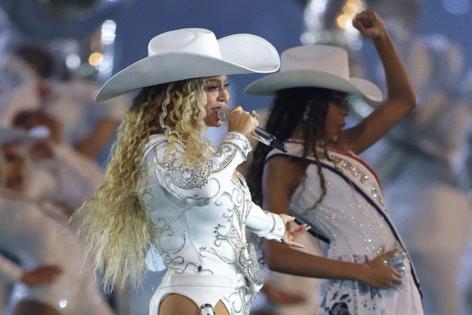Review: Leave it to Beyoncé to make history the star of the Cowboy Carter tour
Published in Entertainment News
LOS ANGELES — Before she'd even sung a second song, Beyoncé was thinking about history Monday night at SoFi Stadium.
The 43-year-old pop superstar had come to Inglewood's gleaming NFL palace to launch her Cowboy Carter world tour, and after opening the show with "Ameriican Requiem" — "Nothing really ends," it goes, "For things to stay the same, they have to change again" — she took a moment to "thank all of those who came before me and allowed me to be on this stage today." Behind her, a giant video wall flickered with images of Linda Martell, Elizabeth Cotten and Sister Rosetta Tharpe: Black pioneers of American roots music whose pathbreaking work Beyoncé picked up and extended with last year's Grammy-winning "Cowboy Carter" LP.
As on the album, she segued from "Ameriican Requiem" to her delicate yet soulful rendition of the Beatles' late-1960s "Blackbird," then went further back still to "The Star-Spangled Banner," which she belted in big, gulping phrases — head tilted back, long hair flowing from beneath a white cowboy hat — against squalling electric guitar that evoked Jimi Hendrix.
"Never ask permission for something that already belongs to you," read a message on the screen in blood-red block letters — a pithy way to sloganize the complicated ideas of reclamation that animate "Cowboy Carter" and 2022's clubby "Renaissance," which Beyoncé has described as the first two acts of a proposed trilogy inspired by marginalized artistic trailblazers. Here, she nimbly intertwined music from the two albums, along with earlier songs from throughout her career, in a nearly three-hour production that framed Black creativity as a wellspring — perhaps the wellspring — of modern American culture.
Am I making this sly and radiant pop extravaganza sound like something somebody wrote on Substack? Monday's show — the first of five at SoFi through May 9 before the tour moves east — rippled with color, wit and sensuality; set pieces included Beyoncé's aerial excursions above the crowd (first on a glowing horseshoe and later in a flying convertible), her ride on a golden mechanical bull accompanied by two bull heads on swiveling robot arms and a priceless moment in which she sat down at a piano, took a hit from a blunt, then lit the piano ablaze.
The singer and her dancers cycled through a seemingly endless array of bedazzled leotards, boots and bodysuits, and her large live band brought both muscle and finesse to songs as varied as the Tina Turner-ish "Ya Ya," the retro-disco "Cuff It," the folky "Flamenco" and whatever kind of music it is that's happening in "II Hands II Heaven," which felt like a moonlit vision quest across some vast desert expanse. Beyoncé's vocals were especially strong in "Bodyguard" — taunting, horny, just slightly behind the beat — and "Heated," where her trademark precision gave way to a sense of ecstatic abandon.
All this showmanship was of course meant to bolster Beyoncé's well-earned reputation as the greatest live performer of her generation — a position of prestige, as she's keenly aware, that hasn't insulated her from certain institutional slights. "Cowboy Carter," she's said, grew out of the frosty reception she received at the 2016 Country Music Association Awards, where she performed her song "Daddy Lessons" with the Chicks to the apparent displeasure of many Nashville insiders. And in one video montage at SoFi, we saw footage from the four times Beyoncé lost album of the year at the Grammys — each to an arguably unworthy competitor — before finally taking the awards show's highest honor this past February.
By shouting out some of her forebears as she did at the top of the show, Beyoncé was contextualizing her experience in a long and complicated story of cultural transaction between Black creators and white gatekeepers. (If you have tickets to one of Beyoncé's tour dates and you've got the afternoon free, consider making it a double feature with director Ryan Coogler's new blockbuster, "Sinners," which ponders similar themes.)
Yet the Cowboy Carter tour is also about Beyoncé's inheritors: The singer's 13-year-old daughter, Blue Ivy, was a featured dancer Monday, and her 7-year-old daughter, Rumi, appeared during the song "Protector," hugging her mother as Beyoncé sang about feeling "proud of who I am because you need me." In a lavish spectacle full of allusions and technology, the gesture was a small one. But it said plenty about why history matters — and whose lives the mattering shapes.
©2025 Los Angeles Times. Visit latimes.com. Distributed by Tribune Content Agency, LLC.













Comments